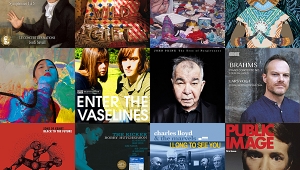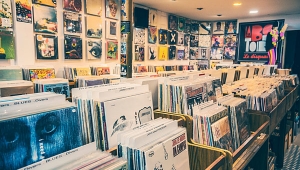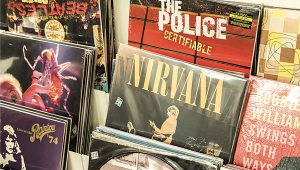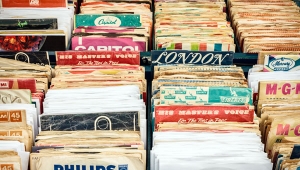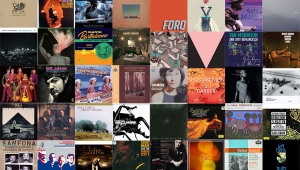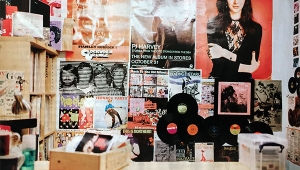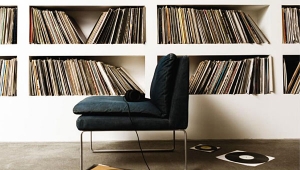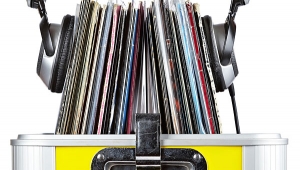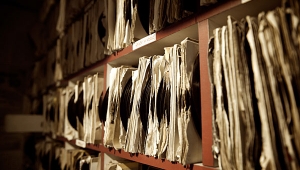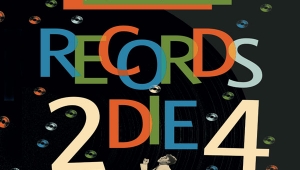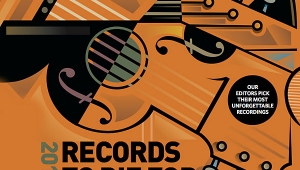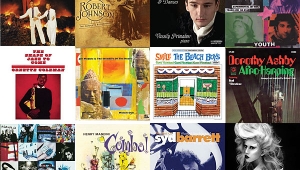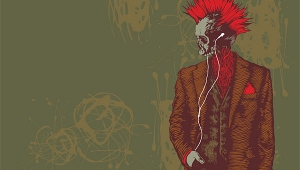| Columns Retired Columns & Blogs |
2002 Records To Die For Page 6
Robert Levine
NATALIE DESSAY: French Opera Arias
Arias by Délibes, Chabrier, Ravel, Meyerbeer, Bondeville, Thomas, Milhaud, Offenbach, Poulenc, Gounod, Sauguet
Natalie Dessay, soprano; Orchestre Philharmonique de Monte Carlo, Patrick Fournillier
EMI 5 56159 2 (CD). 1996. Alain Lanceron, prod. DDD. TT: 65:45
Natalie Dessay is a marvel: her sound is bright, particularly above the staff, but the middle voice is wonderfully developed and warm. The fast passage work is graceful and thrilling. Whether she's portraying Fire in Ravel's L'Enfant et les sortileges, the supremely conflicted Medée of Milhaud's opera, or the doll Olympia in Offenbach's Tales, a remarkable theatricality is evident and an identification with the character shines through. I doubt that Thomas's loony Ophelia (or the equally loony Dinorah in Meyerbeer's opera) have ever had their notes sung better, with more light and shade in the sound itself. Even Lakme's "Bell Song" sounds new. And the fact that there are rarities from operas by Bondeville, Poulenc, and Sauguet makes this elegant CD all the more valuable. (XXI-6)
GLUCK: Orfeo ed Euridice
Bernarda Fink, Veronica Cangemi, Maria Cristina Kiehr; RIAS Kammerchor, Freiburg Baroque Orchestra, René Jacobs
Harmonia Mundi 901742/43 (2 CDs). 2001. Eberhard Geiger, prod. DDD. TT: 90:44
Stinting on neither overt theatrics nor pathos, René Jacobs has managed to remove Orfeo from its exquisite shelf and present it without its "reform opera" baggage. Throughout, startlingly, he allows his singers to embellish the vocal line somewhat, and in Orfeo's great lament ("Che faro"), the generous use of appoggiaturas underscores the character's grief. Mezzo Bernarda Fink finds the right tone for the hero; her use of shading and dynamics is masterly. Amore, in the person of Maria Cristina Kiehr, is innocent and white-voiced (if also tempting), and gives Orfeo hope. Tempos and balances are ideal, from the furious opening to the gentle winds of the Elysian Fields; each scene comes vividly to life, each situation rings true. This is the Orfeo to live with.
LAURIDSEN: Lux Aeterna
Paul Salamunovich, Los Angeles Master Chorale
RCM 19705 (CD). 1998. Peter Rutenberg, prod.; Fred Vogler, eng. DDD. TT: 76:23
Just buy this disc. Hearing the first notes on a good system with adequate bass extension in itself justifies the outlay. (My wife's one-word verdict on hearing the opening on an Accuphase/Halcro/Wilson Benesch system: "Amazing.") The first chord is on D and is six octaves tall. The bass line, at the same time pithy and motoric, is something Brahms would have been proud to have written. The shade of Brahms hovers over this 1997 work, although Morten Lauridsen is entirely his own composer.
VAUGHAN WILLIAMS: An Oxford Elegy
John Westbrook, speaker; Sir David Willcocks, Choir of King's College, Cambridge, Jacques Orchestra
EMI CDM 5 67221 2 (CD). 1969/1999. Christopher Bishop, prod.; Neville Boyling, eng.; Andrew Walter, remastering. ADD. TT: 77:25
As Vaughan Williams grew older, he seemed to develop a touch of melancholy to go along with his characteristic introspection. An Oxford Elegy was written in 1949, the start of the last decade of his life. It is a nostalgic setting—for speaker, chorus, and small orchestra—of lines selected from two Matthew Arnold poems, "The Scholar Gipsy" and "Thyrsis."
THE GRATEFUL DEAD: Ladies and Gentlemen...The Grateful Dead (Fillmore East, April 1971)
Arista GDCD 4075 (4 CDs). 1971/2000. David Lemieux, prod.; Bob Matthews, Betty Cantor-Jackson, engs.; Jeffrey Norman, mix. AAD? TT: 4:56:23
I've been a Deadhead since the late 1960s and Anthem of the Sun, and have accumulated a fair quantity of live bootlegs over the years, including some I've rolled myself. However, ancient tape recordings aren't the most accessible medium in this digital age, and this previously unreleased five-hour live set from 1971 captures the band close to its musical (though not vocal) peak. An impulse purchase made in pique after failing to find anything else that looked interesting in the browsers, Ladies and Gentlemen... took up residence in my CD player and has stayed there for weeks—the best possible argument for a carousel player.
TOOL: Lateralus
Tool Dissectional/Volcano 10132 (HDCD). 2001. Tool, David Bottrill, prods.; Vince de Franco, Neurocistance, engs., mix. DDD? TT: 78:56
Guitar bands might not be the hottest thing these days, but every so often a group comes along that brings new life to the established stereotype. Rage Against the Machine did just that in the mid-1990s, and Tool did something of the same in 2001, Lateralus proving that rock'n'roll is still alive and able to kick butt in the third millennium.
BOB DYLAN: Self Portrait
Columbia CGK 30050 (CD). 1970. Bob Johnston, prod. AAD. TT: 74:03
Greeted with critical scorn and cries of disappointment and confusion from his fans, Bob Dylan's Self Portrait served notice that "the voice of a generation" was tired of that weighty description. So he pushed critics, leftists, folkies, and other hero-worshipping congregations aside with two LPs of pop-inflected, sentimental covers and little song-stories that had nothing to do with politics.
DWIGHT YOAKAM: Hillbilly Deluxe
Reprise 25567-2 (CD). 1987. Pete Anderson, prod. AAD? TT: 33:54
Dwight Yoakam's second album continues the modernization of honky-tonk music he began with Guitars, Cadillacs, Etc. Etc. A more sophisticated statement than he made with that platinum debut, Hillbilly Deluxe shows off a maturing singer-songwriter and producer Pete Anderson's ripening studio skills. Reworking Lefty Frizzell's "Always Late (With Your Kisses)" with a touch of doo-wop, Yoakam honors tradition even as he changes it. (It seems quite possible that Lefty'd be proud to call Dwight's nouveau 'tonk, "Little Ways," his own.) Yoakam also continues to forge a legacy of dark, heartbreak ballads with "1000 Miles" and "Johnson's Love." Hillbilly Deluxe is real country: smart, soulful, stylish.
NATALIE DESSAY: French Opera Arias
Arias by Délibes, Chabrier, Ravel, Meyerbeer, Bondeville, Thomas, Milhaud, Offenbach, Poulenc, Gounod, Sauguet
Natalie Dessay, soprano; Orchestre Philharmonique de Monte Carlo, Patrick Fournillier
EMI 5 56159 2 (CD). 1996. Alain Lanceron, prod. DDD. TT: 65:45
Natalie Dessay is a marvel: her sound is bright, particularly above the staff, but the middle voice is wonderfully developed and warm. The fast passage work is graceful and thrilling. Whether she's portraying Fire in Ravel's L'Enfant et les sortileges, the supremely conflicted Medée of Milhaud's opera, or the doll Olympia in Offenbach's Tales, a remarkable theatricality is evident and an identification with the character shines through. I doubt that Thomas's loony Ophelia (or the equally loony Dinorah in Meyerbeer's opera) have ever had their notes sung better, with more light and shade in the sound itself. Even Lakme's "Bell Song" sounds new. And the fact that there are rarities from operas by Bondeville, Poulenc, and Sauguet makes this elegant CD all the more valuable. (XXI-6)
GLUCK: Orfeo ed Euridice
Bernarda Fink, Veronica Cangemi, Maria Cristina Kiehr; RIAS Kammerchor, Freiburg Baroque Orchestra, René Jacobs
Harmonia Mundi 901742/43 (2 CDs). 2001. Eberhard Geiger, prod. DDD. TT: 90:44
Stinting on neither overt theatrics nor pathos, René Jacobs has managed to remove Orfeo from its exquisite shelf and present it without its "reform opera" baggage. Throughout, startlingly, he allows his singers to embellish the vocal line somewhat, and in Orfeo's great lament ("Che faro"), the generous use of appoggiaturas underscores the character's grief. Mezzo Bernarda Fink finds the right tone for the hero; her use of shading and dynamics is masterly. Amore, in the person of Maria Cristina Kiehr, is innocent and white-voiced (if also tempting), and gives Orfeo hope. Tempos and balances are ideal, from the furious opening to the gentle winds of the Elysian Fields; each scene comes vividly to life, each situation rings true. This is the Orfeo to live with.
![]()
John Marks
LAURIDSEN: Lux Aeterna
Paul Salamunovich, Los Angeles Master Chorale
RCM 19705 (CD). 1998. Peter Rutenberg, prod.; Fred Vogler, eng. DDD. TT: 76:23
Just buy this disc. Hearing the first notes on a good system with adequate bass extension in itself justifies the outlay. (My wife's one-word verdict on hearing the opening on an Accuphase/Halcro/Wilson Benesch system: "Amazing.") The first chord is on D and is six octaves tall. The bass line, at the same time pithy and motoric, is something Brahms would have been proud to have written. The shade of Brahms hovers over this 1997 work, although Morten Lauridsen is entirely his own composer.
Lux Aeterna gives off a vibrant glow, despite its being a setting of five choral texts usually associated with the Latin Mass for the dead. The overall architecture of the piece, strongly symmetrical, finds parallels in Brahms' A German Requiem, although I also hear echoes of Janácek's distinctive tonality. Critic David Patrick Stearns is probably closest when he mentions Aaron Copland's forthrightness of expression as a probable influence on Lauridsen. But neither Charles Ives nor Roy Harris could be faulted if they were to feel a little pride too. You have to hear it to believe it, but Lauridsen has managed to write a Latin Requiem in an unmistakably American idiom. What is even better, it works.
Lux Aeterna is at once haunting and consoling, and a composer probably can't ask for more than that. Serious music indeed for serious times indeed, but Lux Aeterna is also resolutely confident and confidently joyful.
The remainder of this exceptional disc includes Lauridsen's beautiful settings of Rilke's French love poetry (the beginning of "Dirait-on..." is one of those "hair standing up on the back of your neck" moments), and two other works. I wish they had recorded somewhere else and used about one-eighth as many microphones, but we can't have everything, now, can we?
VAUGHAN WILLIAMS: An Oxford Elegy
John Westbrook, speaker; Sir David Willcocks, Choir of King's College, Cambridge, Jacques Orchestra
EMI CDM 5 67221 2 (CD). 1969/1999. Christopher Bishop, prod.; Neville Boyling, eng.; Andrew Walter, remastering. ADD. TT: 77:25
As Vaughan Williams grew older, he seemed to develop a touch of melancholy to go along with his characteristic introspection. An Oxford Elegy was written in 1949, the start of the last decade of his life. It is a nostalgic setting—for speaker, chorus, and small orchestra—of lines selected from two Matthew Arnold poems, "The Scholar Gipsy" and "Thyrsis."
Against a background of gently swelling strings and soft choral voices, the speaker reminisces about late-summer afternoon outings in the country around Oxford at the turn of the 19th century to the 20th. If that strikes you as a bit twee or fey, keep in mind that the world was a nearly unimaginably different place back then. No one—apart, perhaps, from H.G. Wells—could imagine the horrors of a world war, followed by worldwide economic contraction, followed by another world war, followed by the threat of nuclear annihilation. But at a time—the beginning of the Cold War—when another war seemed imminent, Vaughan Williams cast his memory back to 1901, when he had wanted to write an opera based on "The Scholar Gipsy."
The remove of time and distance and the shadow of intervening events lend an Elgarian glow of autumnal light to An Oxford Elegy. And Vaughan Williams keeps faith with his younger self: "the light we sought is shining still." I can't imagine a more idiomatically authoritative performance than this one, led by Sir David Willcocks. This CD compilation of old and new recordings includes other Vaughan Williams choral rarities, one previously unpublished, as well as Flos Campi for viola, orchestra, and chorus, all at a bargain price.
![]()
Paul Messenger
THE GRATEFUL DEAD: Ladies and Gentlemen...The Grateful Dead (Fillmore East, April 1971)
Arista GDCD 4075 (4 CDs). 1971/2000. David Lemieux, prod.; Bob Matthews, Betty Cantor-Jackson, engs.; Jeffrey Norman, mix. AAD? TT: 4:56:23
I've been a Deadhead since the late 1960s and Anthem of the Sun, and have accumulated a fair quantity of live bootlegs over the years, including some I've rolled myself. However, ancient tape recordings aren't the most accessible medium in this digital age, and this previously unreleased five-hour live set from 1971 captures the band close to its musical (though not vocal) peak. An impulse purchase made in pique after failing to find anything else that looked interesting in the browsers, Ladies and Gentlemen... took up residence in my CD player and has stayed there for weeks—the best possible argument for a carousel player.
First impressions were worrying. This sounds more like a bootleg than the Dead's classic live recordings, and you get plenty of warts among the jewels. Bob Weir's voice takes at least one disc to get going properly, and this isn't a recording for those who wince at out-of-tune singing.
But the sheer "live" immediacy takes over. Timing is king, and you can't tamper around with it here. Among these five hours is plenty to savor, with magic renditions of classic tracks like "Ripple," "Uncle John's Band," and "Goin' Down the Road Feeling Bad." And the CD medium makes it easy to skip tracks you don't like, or when the band gets too self-indulgent. Garcia is in magnificent form throughout, though Phil Lesh's bass might have been a little fatter in the mix.
TOOL: Lateralus
Tool Dissectional/Volcano 10132 (HDCD). 2001. Tool, David Bottrill, prods.; Vince de Franco, Neurocistance, engs., mix. DDD? TT: 78:56
Guitar bands might not be the hottest thing these days, but every so often a group comes along that brings new life to the established stereotype. Rage Against the Machine did just that in the mid-1990s, and Tool did something of the same in 2001, Lateralus proving that rock'n'roll is still alive and able to kick butt in the third millennium.
Tool does the sort of full-on, in-yer-face, hard'n'heavy material that makes rock the music of choice for adolescents of both sexes. But Tool is an altogether more subtle, versatile, and multidimensional beat combo than the sort of groups that have given heavy metal such a bad name through the years.
There's genuine dynamic range here, and although the lyrics sometimes sail a bit too close to the pomp/prog reefs for comfort, the musicianship is classy throughout, and Tool's bass'n'drums engine room is one of the best I've heard in years. They propel the music with great momentum, but with sufficient subtlety and variation to maintain the interest of even an ageing, heard-it-all-before cynic like yrs trly.
The sound doesn't perhaps quite match the slam and drive of the legendary first Rage Against the Machine album, but it more than passes muster. This is real, strong rock'n'roll for people with brain cells.
![]()
Michael Metzger
BOB DYLAN: Self Portrait
Columbia CGK 30050 (CD). 1970. Bob Johnston, prod. AAD. TT: 74:03
Greeted with critical scorn and cries of disappointment and confusion from his fans, Bob Dylan's Self Portrait served notice that "the voice of a generation" was tired of that weighty description. So he pushed critics, leftists, folkies, and other hero-worshipping congregations aside with two LPs of pop-inflected, sentimental covers and little song-stories that had nothing to do with politics.
Gone was the jagged dagger of a voice, replaced by the nearly dulcet tones of a relaxed rhapsodist unafraid to be something other than cool. On the cover of "I Forgot More Than You'll Ever Know," Dylan caresses the lyrics with the warmth and care he gave "She Belongs to Me" and other love songs on previous albums; with his vocals backed by pedal-steel and brushed drums, the song evokes a Depression-era country lament—an ambience that runs through much of the album. Also noteworthy are the charming crooning of Rodgers and Hart's "Blue Moon," the bluesy amble of "Alberta #1," and the lush, courtly "Copper Kettle."
If, back when Self Portrait was released, fans and critics had been less preoccupied with their sense of abandonment, they'd have noticed that Dylan had artfully smashed the common wisdom that he couldn't sing—and unloaded the burden of being the counterculture's messiah. Now that his crucifixion is more than 30 years gone, it's okay to enjoy this much-maligned gem.
DWIGHT YOAKAM: Hillbilly Deluxe
Reprise 25567-2 (CD). 1987. Pete Anderson, prod. AAD? TT: 33:54
Dwight Yoakam's second album continues the modernization of honky-tonk music he began with Guitars, Cadillacs, Etc. Etc. A more sophisticated statement than he made with that platinum debut, Hillbilly Deluxe shows off a maturing singer-songwriter and producer Pete Anderson's ripening studio skills. Reworking Lefty Frizzell's "Always Late (With Your Kisses)" with a touch of doo-wop, Yoakam honors tradition even as he changes it. (It seems quite possible that Lefty'd be proud to call Dwight's nouveau 'tonk, "Little Ways," his own.) Yoakam also continues to forge a legacy of dark, heartbreak ballads with "1000 Miles" and "Johnson's Love." Hillbilly Deluxe is real country: smart, soulful, stylish.
- Log in or register to post comments

